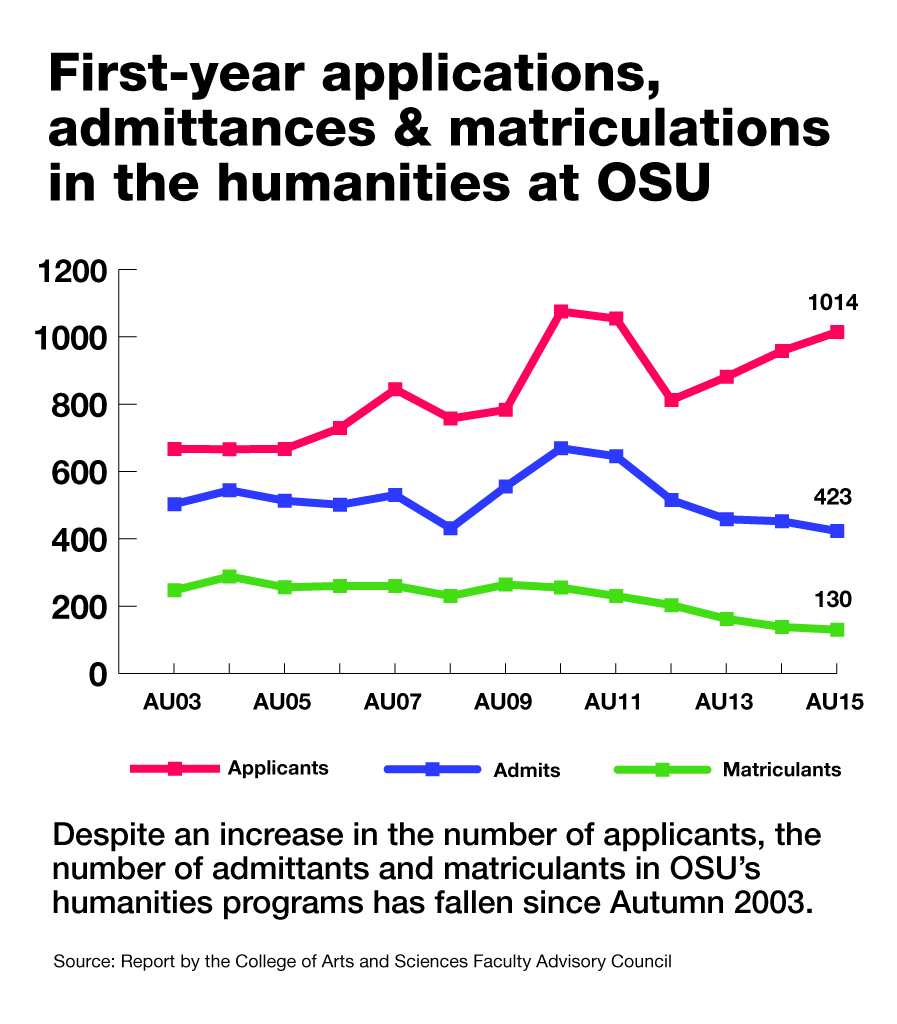
Denny Check | Managing Editor of Design
Ohio State offers more than 200 majors that allow students to specialize in a myriad of subjects, but that could be in jeopardy as humanities majors have seen an enrollment decline, a trend that some believe could have long-term consequences.
When the university published its strategic enrollment plan for 2012 to 2017, it outlined its goals to increase enrollment at OSU at no cost to the academic diversity. After examining enrollment data, the College of Arts and Sciences Faculty Advisory Council has drafted a recommendation it believes will help the university fulfill that goal.
The chair of the ASC faculty senate, Tom Hawkins, explained the group’s desire for the university to reevaluate the enrollment policies.
“The kind of community we want to have here at this university is based on having a rich diversity of intellectual perspectives,” he said.
The recommendation that the group sent to University President Michael Drake, as well as Interim Provost and Executive Vice President Bruce McPheron, called for the university “to adjust its acceptance and recruitment practices so that all colleges and divisions of colleges at OSU are supplied with qualified students.”
“Changes in enrollment levels in particular disciplines can be due to a variety of complex factors,” university spokesman Chris Davey said in an email. “Managing enrollment and admissions at a comprehensive university like Ohio State is a complicated and dynamic process that we are constantly refining and improving, and the faculty are important partners in this.”
According to enrollment data compiled and analyzed by Alan Farmer, an associate professor in the Department of English, the number of university applicants has increased since 2012, including the number of students indicating a desire to pursue a humanities major. However, the number of humanities students admitted to the university has gone down while natural and mathematical sciences and social and behavioral sciences have increased.
This is not an isolated trend at OSU, though. Harvard University’s arts and humanities department published the Harvard Humanities Project in 2013, that found nationally, the number of humanities majors is decreasing.
While Harvard projected that its humanities majors would decrease from 24 to 17 percent of its students by 2016, the OSU faculty council projects its trend to be more extreme. Todd Thompson, a member of the Faculty Advisory Council and a professor in the Department of Astronomy, said he analyzed Farmer’s data and projected that there will be no humanities majors at OSU by 2019.
“We’ve been puzzled and concerned that even as the applications are going up, admissions in the humanities are going down, and significantly,” said Jill Galvan, an associate professor in the English department and a member of the Faculty Advisory Council who also worked on the report.
The acceptance numbers of humanities students has decreased since 2012, despite increasing acceptance numbers across the other departments in the College of Arts and Sciences, natural and mathematical sciences and social and behavioral sciences. Overall enrollment in the humanities departments has decreased by 49 percent since 2010, according to Farmer’s report. This could have far-reaching effects beyond just fewer students in the departments.
“It’s good for people to know that our enrollments in an individual department are coupled to our budgets, and so a decline in enrollments leads to a decline in budget, leads to more decline and so it’s a quick spiral,” Thompson said about the long-term effects.
With fewer majors enrolled in the departments, there would be fewer courses offered through them. In turn, this means less revenue for those departments, creating further issues, according to the council’s findings.
In the report, the advisory council argue that the decline in majors could ultimately lead to the departments only providing general education courses without offering any of their own majors.
“Students who want to major in the humanities, I think they should be allowed to pursue that. They’re adults and they should be allowed to enter into the university pursuing what they have decided to do,” Galvan said.


